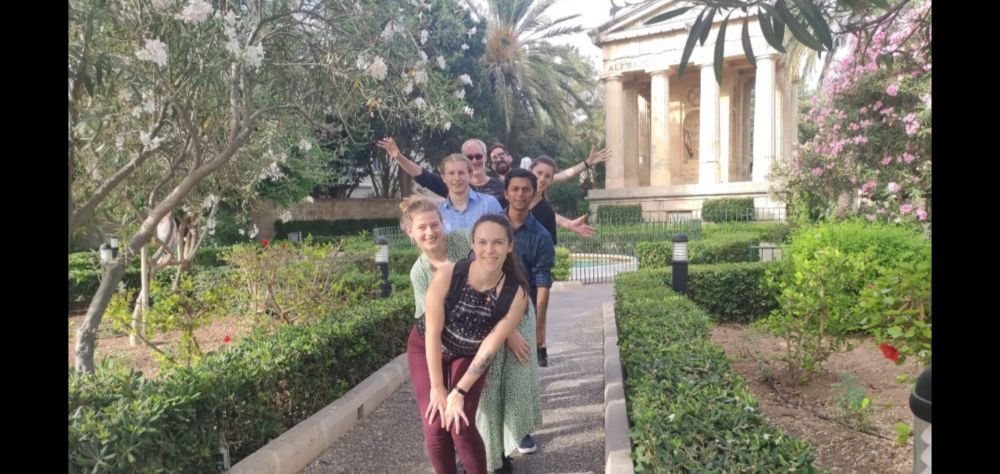Latest News
8 August 2022
GoGreenRoutes: Malta Summer School’s European Vision
In July, GoGreenRoutes hosted its Summer School in Malta for early career researchers. The following is a first hand account of Jack Fionn Hilliard's experiences there and the unique learning opportunities that participants had in creative exercises together at the Summer School:
As part of Maynooth University’s SPUR (Summer Undergraduate Experimental Research) Programme, Marcus Broughill and D’Andra Andrews and I participated as interns supervised by Dr. Tadhg MacIntyre and Ph.D. researcher Dr. Cassandra Murphy to assist in their work in the Dept. of Psychology. It was a unique opportunity to be able to learn from Europe’s leading eco-researchers. We worked with early career researchers with diverse skillsets ranging from environmental science, landscape architecture, cognitive psychology, and engineering amongst many others to achieve one of the aims of the summer school, designing Nature-based Solutions (NBS) for the re-development of one of the most famous thoroughfares in Malta, St. Anne’s Street, Floriana.
Big Ideas, Small Steps
The opening day was marked by addresses by the former President of the Republic of Malta, Marie-Louise Coleiro Preca, Maltese Minister of Public Works and Planning, Stefan Zrinzo Azzopardi, Maltese MP Katya De Giovanni PhD, and Conrad Borg Mayor of Gzira, our partner city in GoGreenRoutes, who were introduced by Dr. Mario Balzan of Ecostack Innovations. It was inspiring to see so much political will backing such a vital project.
An overview of the NBS context at European and local level by Drs Balzan and MacIntrye preceded Dr Frankie Boyd, the founder of research consultancy Blooming Research used an interactive approach as she explained to us about how to communicate science to different audiences. Frankie implored us to think beyond writing for a scientific audience and to look at the bigger picture of how we could impact citizens and policy makers. Food and social scientist, Alan Scarry, a doctoral researcher from the University of Limerick then brought us back into our teams with engaging activity TaskMaster: Sustainability in Action, which would add friendly competition to the learning environment.
Progress, Practicality, Virtual Reality
On a blistering hot morning we each made our own journeys towards St. Anne’s, congregating at the Lion Fountain, where the first stone was laid in the Renaissance city. It was striking to be surrounded by such beauty and unfortunately, pollution. Our teams set about measuring the air quality of the street to figure out which areas where most impacted. Each team would present their ideas on the final day, called “Dragon’s Den”.
We embarked on more group activities before viewing a presentation on Virtual Nature Scenarios by Prof. Giovanna Calogiuri from the University of South-Eastern Norway. This was an exploration into how computer technology using the Oculus VR headset or low-cost cardboard smartphone versions can be used to create virtual natural environments which can help address the lack of accessibility to green spaces for some populations in the EU, e.g., those with physical disabilities.
The day was rounded-off with a fun activity by Frankie, where a fairy-tale had to be written as a scientific abstract to demonstrate how simple concepts can be unnecessarily overcomplicated.
"Il-mistoqsija oħt il-għerf" (The question is the sister of wisdom) Maltese Proverb
The final day was to be the real test of our ability to put our recently learned skills together. Terri Morrisey spoke to us about her recent book “Making Uncertainty Work for You”. In the current era, where so much is changing so fast and an abundance of knowledge is readily available, the real valuable skills, Terri argues, is being comfortable with the uncomfortable, to be able to learn and relearn as needed.
Frankie then took us through a crash-course on social media and science, focusing on how researchers can promote themselves in the present day ‘influencer’ centric landscape as the days of publishers being gatekeepers are mostly gone. We then had an inspirational practise run on our presentation skills which involved singing and dancing, to get the scientific juices flowing before Dragon’s Den. Some of the ideas presented were incredible, such as the creation of wind corridors through reflectors or the ambitious infrastructure proposal to install a tramline circling Valetta which would remove cars from the city. We learnt from each other and from the experts who pointed out the holes in our plans, allowing us to adopt insights that, individually would be impossible to see. This steep-learning curve will help to temper our developing presentation skills.
Closing Remarks
The Summer School was a fantastic experience and opening into the world of research which tapped into the nexus of European scientific development, while also drawing on people from all corners of the globe, such as India, Brazil, Canada, and the USA. The experience fostered a collaborative mindset to problem solving that transcends all of our petty struggles combined. It is clear to see that the 'Old World' still very much has something left to offer in powering a new, vibrant, and brighter future, safeguarding our environment for generations to come.
Jack Hilliard is an undergraduate, B.A. Psychology student at Maynooth University, working as an Intern under Dr. Tadhg MacIntyre and Ph.D. researcher Cassandra Murphy as part of the SPUR Programme. Jack has a keen interest in environmental and clinical psychology and hopes to continue his studies in these areas.
Learn more about the full experience in Malta here.
Group photo Malta (Jack Hilliard) by "Jack Hilliard", licensed under some rights reserved, for promotion


